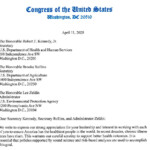Budget Resolution Clears House, Setting Up Negotiations on Spending and Savings
On April 10, the House narrowly passed the Senate-amended budget resolution, 216–214, clearing the way for Republicans to begin reconciliation efforts to extend the 2017 tax cuts and pursue up to $1.5 trillion in spending cuts. The House Agriculture Committee was instructed to identify $230 billion in savings, compared to $1 billion in the Senate’s version. It remains unclear if or how the House Ag Committee will reach the targeted savings. Ag Committee leaders have also indicated the potential for adding enhanced Farm Bill and crop insurance programs, which would create additional costs that would also have to be offset.
 MAHA Oversight Commission Letter
MAHA Oversight Commission Letter
The USCA collaborated with other agricultural stakeholders on a congressional sign-on letter. As part of this effort, USCA helped secure 79 signatures from the House and Senate, including members from key canola-growing regions such as Minnesota, Idaho, Montana, and Washington. The letter was led by Senators Ricketts and Fischer, along with Representatives Feenstra and Alford. We recognize their leadership in promoting science-based, risk-driven approaches to public health policy. Ensuring that the Make America Healthy Again Commission bases its decisions on sound science is essential—not only for improving public health outcomes, but also for protecting the future of U.S. agriculture and maintaining a secure, affordable food supply. Read the MAHA Oversight Commission Letter.
 USCA Submits Comments to Treasury on Biofuels Tax Credit
USCA Submits Comments to Treasury on Biofuels Tax Credit
On April 10, USCA submitted comments on the Section 45Z Clean Fuel Production Tax Credit Guidance, available here. Issued by the outgoing Biden Administration in January, the Guidance excluded canola-based biofuels from eligibility. USCA, coordinating with industry partners, urged the Administration to establish a temporary value for canola biofuels, remove indirect emissions from the calculation, and correct flaws in the direct emissions value. The current Administration has not yet indicated how it will implement 45Z, and USCA continues to engage with Congress and the Administration on the issue.
CFAA Workshop Examines Biofuels Emissions and Uncertainty of Indirect Land Use Analysis
USCA Director Tom Hance and representatives from several canola industry partners attended the annual workshop hosted by the Clean Fuels Alliance of America (CFAA). The workshop brings together practitioners and stakeholders to examine and discuss issues relating to biofuels’ life-cycle analysis. This year’s workshop, held in early April in Kansas City, MO, focused on indirect land use emissions and included perspectives from experts and academics. Participants included representatives from Argonne National Laboratory, which administers the GREET model that is being used to determine emissions and tax credit values for biofuels.
USDA Deferred Resignation (DRP, 2.0) and Reduction in Work Force (RIF)
The USDA is finalizing numbers on its second buyout offer, with reports indicating up to 12,000 employees may have accepted before the program closed last Tuesday. Leaders of the House Agriculture Committee, including Chair GT Thompson and Ranking Member Angie Craig, have expressed concerns about the loss of experienced staff and potential impacts on agency productivity. Craig plans to reach out directly to USDA Secretary Brooke Rollins, who stated that FSA employees are exempt from buyouts to preserve frontline support for farmers. Rollins also noted that some offices, particularly those overlapping with agencies such as Rural Development, may undergo restructuring.
 Overview of Updated U.S. Tariff Rates and Trade Adjustments
Overview of Updated U.S. Tariff Rates and Trade Adjustments
April saw significant shifts in U.S. trade policy, beginning with “Liberation Day,” when the U.S. imposed reciprocal tariffs ranging from 10% to 47% on many countries. Shortly after, President Trump announced a 90-day pause, reducing most tariffs to a flat 10%, except for China, which now faces a 145% tariff after retaliating.
Breakdown of the Current Tariffs Being Implemented by the U.S:
- China: 145% Tariff
- All Other Countries with Reciprocal Tariffs (Annex 1): Reduced to 10%
- Canada and Mexico: 25% tariff on non-USMCA compliant products and 10% of non-USMCA energy and potash, 0% tariff on USMCA compliant products
- Aluminum and Steel: 25%
Breakdown of International Responses to U.S. Tariffs:
- China: 125% Tariff. China stated on April 11th that they will not retaliate further.
- European Union: On April 9, the EU approved a €22 billion package of retaliatory tariffs in response to U.S. steel and aluminum tariffs. While the final list has not been released, it is expected to closely mirror earlier proposals, minus bourbon, wine, and dairy. The tariffs were initially scheduled to roll out in three phases—April 15, May 1, and December 1—but following President Trump’s announcement of a 90-day pause on U.S. tariffs, the EU agreed on April 10 to pause its retaliatory measures for 90 days as negotiations continue.
 Ambassador Greer Testifies on Tariffs, Trade Goals, and Negotiation Strategy
Ambassador Greer Testifies on Tariffs, Trade Goals, and Negotiation Strategy
Earlier this month, USCA attended two key hearings on trade policy: the Senate Finance Committee Hearing on the President’s Trade Agenda and the House Ways and Means Committee Hearing on U.S. Tariff Strategy. Below are takeaways from Ambassador Greer’s testimony:
- The primary goal of the tariffs is to achieve true reciprocity in trade relationships.
- The U.S. is open to negotiating with countries that propose plans to reduce trade deficits and eliminate both tariff and non-tariff barriers.
- Tariffs are intended as a short-term strategy to support long-term trade agreements.
- The U.S. will enforce measures against countries helping China circumvent tariffs, with implications for USMCA enforcement.
Ag Trade Update: USDA Nominee Heads to Senate, USTR Choice Revealed
The administration is moving forward with key leadership nominations for U.S. agricultural trade, with the Senate set to review the USDA undersecretary nominee and a new USTR chief ag negotiator announced.
 USDA Undersecretary for Trade and Foreign Agricultural Affairs – On April 29, the Senate Agriculture Committee held a confirmation hearing for nominee Luke Lindberg. During the hearing, Lindberg underscored the importance of promotional programs like MAP, RAPP, and FMD and stressed the need to eliminate non-tariff barriers to expand global market access for U.S. farmers. A strong proponent of Free Trade Agreements, Lindberg brings extensive international trade experience in the role, currently serving as President & CEO of South Dakota Trade. He previously served as the Chief of Staff and Chief Strategy Officer at the Export-Import Bank of the United States, where he played a key role in strategic initiatives such as the U.S.-China trade program and critical export markets.
USDA Undersecretary for Trade and Foreign Agricultural Affairs – On April 29, the Senate Agriculture Committee held a confirmation hearing for nominee Luke Lindberg. During the hearing, Lindberg underscored the importance of promotional programs like MAP, RAPP, and FMD and stressed the need to eliminate non-tariff barriers to expand global market access for U.S. farmers. A strong proponent of Free Trade Agreements, Lindberg brings extensive international trade experience in the role, currently serving as President & CEO of South Dakota Trade. He previously served as the Chief of Staff and Chief Strategy Officer at the Export-Import Bank of the United States, where he played a key role in strategic initiatives such as the U.S.-China trade program and critical export markets.
 USTR Chief Ag Negotiator – President Trump will nominate Doug Hoelscher, an Iowa native currently working at the America First Policy Institute. Before joining AFPI in 2021, Hoelscher held two positions during the first Trump administration, first as the deputy director of White House intergovernmental affairs, then as the assistant to the president for intergovernmental affairs. He also worked for the state of Iowa in the Office of State-Federal Relations and held multiple positions in the Department of Homeland Security during the George W. Bush administration.
USTR Chief Ag Negotiator – President Trump will nominate Doug Hoelscher, an Iowa native currently working at the America First Policy Institute. Before joining AFPI in 2021, Hoelscher held two positions during the first Trump administration, first as the deputy director of White House intergovernmental affairs, then as the assistant to the president for intergovernmental affairs. He also worked for the state of Iowa in the Office of State-Federal Relations and held multiple positions in the Department of Homeland Security during the George W. Bush administration.


 Setting the Record Straight: Canola Growers Defend the Facts on Seed Oils
Setting the Record Straight: Canola Growers Defend the Facts on Seed Oils Canola in the Crosshairs: Farmers Warn of Economic Fallout from RFK Jr.’s Health Push and Tariff Talk
Canola in the Crosshairs: Farmers Warn of Economic Fallout from RFK Jr.’s Health Push and Tariff Talk